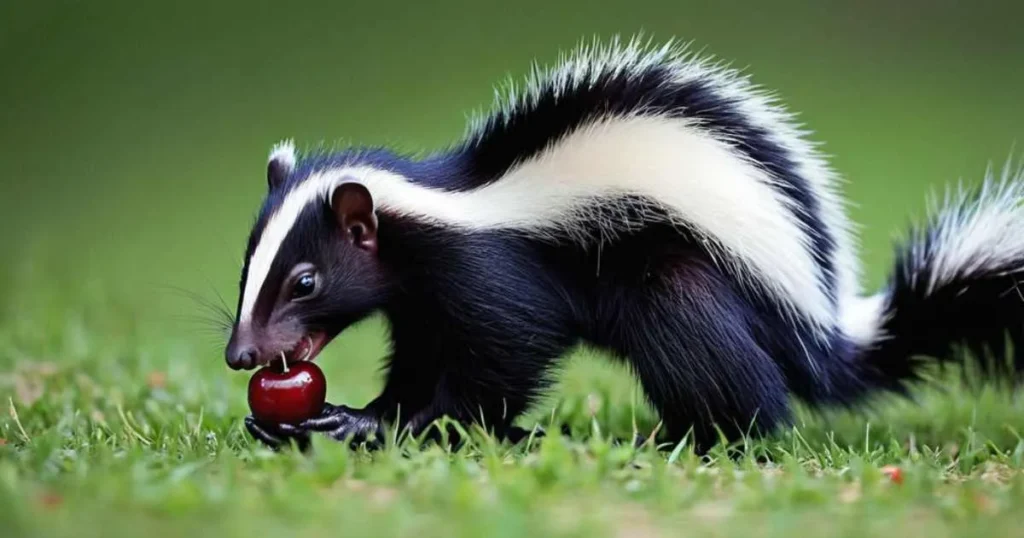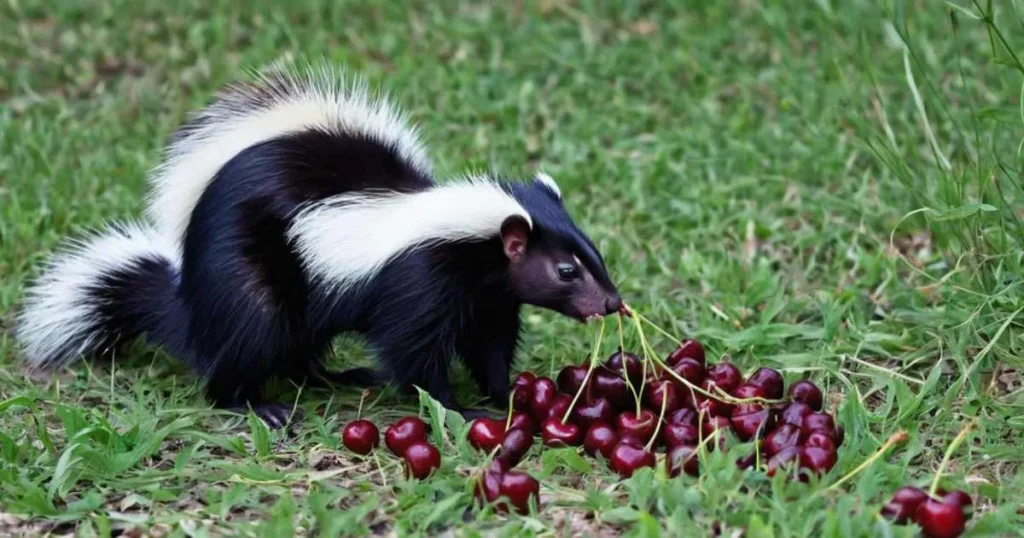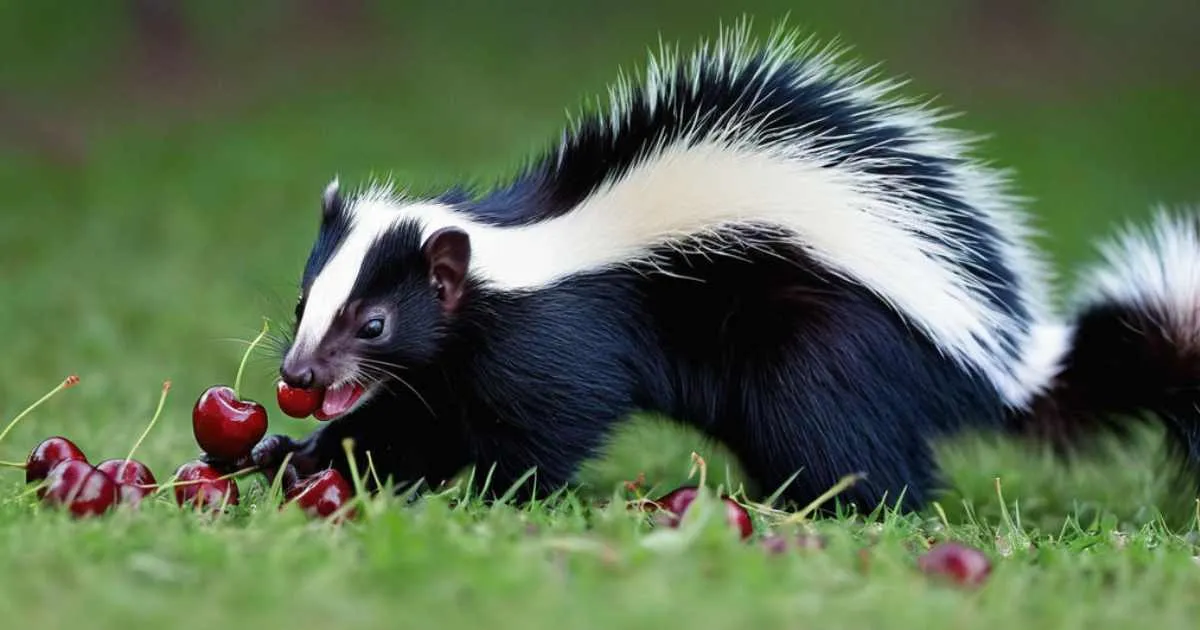Feeding Skunks Cherries: Benefits and Tips
Last updated on August 11th, 2024 at 07:33 am
As a skunk pet owner and wildlife enthusiast, I can tell you that skunks absolutely love cherries! These curious creatures, known for their black and white stripes, have a taste for a variety of foods, and juicy cherries are definitely on their menu. Skunks aren’t picky eaters; they enjoy a mix of fruits, insects, and even small mammals. In the warmer months, you’ll often find them snacking on cherries and other fruits. If you’re a gardener, you might spot them in your orchard, taking advantage of the sweet bounty. Understanding what skunks eat can help you manage your garden and appreciate these unique animals better. Keep reading to learn more about the fascinating diet of skunks and how they can even help control pests in your yard!
The Skunk’s Diet
When thinking about what skunks munch on, many may not consider fruits like cherries. These black and white critters have an eclectic palate. Exploring the skunk’s diet unveils a world of dietary diversity. Let’s nibble into the omnivorous nature of skunks and their typical food sources.
Omnivorous Nature
Skunks don’t just stick to one type of food. They enjoy both plants and animals. Their flexible diet includes:
- Insects and grubs
- Small rodents
- Fruits and berries
- Worms and larvae
This variety helps skunks to thrive in different habitats. With such an adaptable appetite, they can find food almost anywhere.
Typical Food Sources
Skunks have favorite snacks. Their typical meals often comprise:
| Food Category | Examples |
|---|---|
| Animals | Insects, small mammals, bird eggs |
| Plants | Cherries, apples, corn |
Among these, cherries provide a sweet treat for skunks. They often raid orchards in search of these juicy fruits. While cherries are not the main staple, they are a delightful part of a skunk’s diet.
Cherry Tales
Have you ever spotted a skunk in your backyard and wondered what it munches on? These striped foragers enjoy a variety of foods, including something as sweet and delightful as cherries. Let’s unpack the fruit bowl of skunk diets and discover their taste for these ruby-red morsels.
Fruit In A Skunk’s Diet
Skunks are omnivores with diverse appetites. They have a particular liking for fruits. Fruits offer essential vitamins and a quick energy boost to keep them spry.
- Seasonal berries and fallen fruit
- High-energy sugary snacks for night-time foraging
- Insects and small rodents complete their diet
The Appeal Of Cherries
Cherries are a skunk favorite for many reasons.
These juicy fruits not only satisfy their sweet tooth but also provide hydration during dry spells.
| Why Skunks Love Cherries |
| Sweetness |
| Water content |
| Easy to find on the ground |
| Nutritional value |
Cherry trees offer low-hanging bounty that skunks find hard to resist.
These fruits are not just a treat for humans, but a much-loved feast for our black and white friends too!
Feeding Habits
Imagine a skunk wandering in your backyard. What does it eat? Skunks are known for their varied diet. These little creatures often surprise people with their food choices. Cherries are on the menu for these nocturnal feeders. Let’s dive into the feeding habits of skunks, revealing their foraging patterns and nighttime dining preferences.

Foraging Patterns
Skunks are not picky eaters. Their diet includes fruits, insects, and small mammals. During the day, they stay hidden. As twilight fades, their search for food begins. Cherries, among other fruits, attract skunks with their scent and color.
- Fruits and berries
- Insects and larvae
- Small mammals and eggs
In cherry season, these animals take advantage of the abundant fruit. They forage on the ground and sometimes climb trees for the ripest cherries.
Night Time Dining Preferences
As night falls, skunks become more active. They prefer to dine in the safety of darkness. Cherries provide a vital energy source for night-time activities.
| Food Type | Preference |
|---|---|
| Cherries | High |
| Small Mammals | Moderate |
| Insects | Low |
Cherries are not just a daytime snack; they’re a nighttime favorite too. Sweet and easy to find, skunks often seek out cherry trees after dusk.
Nutritional Needs
Skunks are known for their unique spray, but their diet is just as interesting! Skunks are omnivores. This means they eat both plants and animals.
Cherries can be part of a skunk’s diet because they are sweet and nutritious.
Dietary Benefits Of Cherries
Cherries are not only tasty; they’re packed with goodness for skunks:
- Vitamins: They offer vitamins A and C.
- Antioxidants: Cherries have compounds that help fight disease.
- Fiber: Good for digestion.
These juicy fruits can help keep a pet skunk healthy. Cherries also have low fat which is great for skunks.
Balancing The Skunk’s Diet
A balanced diet is as important for skunks as it is for any animal. Include proteins, fruits, and veggies in their meals.
| Type of Food | Benefits |
|---|---|
| Proteins (chicken, eggs) | Builds muscle, heals the body. |
| Fruits (cherries, apples) | Builds muscle, and heals the body. |
| Vegetables (carrots, sweet potatoes) | Provides energy, and keeps skin healthy. |
Balanced meals prevent obesity and health issues in skunks.
Feeding cherries as a treat is a good idea. But not too many because they are sweet.
Seasonal Feeding
Skunks have diverse diets. They often change what they eat with the seasons. Cherries become a favorite when they’re ripe and plentiful.
Cherry Season Availability
In the warm months, cherries are ripe for the picking. Skunks feast on these juicy fruits, enjoying the sweet bounty. These months offer natural cherry snacks:
- Spring to Summer: Peak cherry time.
- Fruits are the easiest to find.
- Skunks eat more cherries.
Alternative Foods In Off-Seasons
When cherries aren’t around, skunks must find other food. They turn to:
| Season | Food Sources |
|---|---|
| Fall | Fallen fruits, nuts, and seeds |
| Winter | Small rodents, insects, and carrion |
They adapt well and always find something to fill their bellies.
Wild Vs. Domestic Skunks
Sneaking through the underbrush, skunks are well known for their signature scent. Yet, their diet is just as intriguing, especially when considering wild and domestic skunks. Skunks may love to feast on a variety of edibles and believe it or not, cherries could be a part of their menu.
Diet Variations
Wild skunks have diverse diets, feasting on an array of food found in their habitat. Their menu often includes:
- Insects and grubs
- Small rodents
- Fruits like cherries
- Berries
- Eggs from ground-nesting birds
In contrast, domestic skunks, often kept as pets, follow a more controlled diet tailored by their owners. These skunks may enjoy:
- Commercial skunk food
- Cooked vegetables
- Selected fruits, including cherries, in moderation
- Protein sources like chicken or turkey
Impact Of Human Proximity
Living close to humans can significantly alter a skunk’s eating habits. Human environments are abundant with:
| Food Source | Effect on Diet |
|---|---|
| Gardens and fruit trees | Increase in fruit intake, including cherries |
| Pet food leftovers | More diverse protein and grain consumption |
| Trash and compost | Access to a myriad of human food scraps |
Skunks adapt to their surroundings, and those inhabiting areas near humans might find cherries more frequently on their plates, albeit from fallen fruit or unsecured bins.
Potential Dangers
Skunks are curious creatures with a diverse diet. They might eat cherries, but this raises some safety issues. Let’s explore the potential dangers that come into play.
Toxicity Concerns
Cherries can be risky for skunks. The flesh is safe, but other parts are not.
- Cherry pits contain cyanide, which is harmful to skunks.
- Leaves and stems also have toxic substances.
- Too many cherries can cause digestive problems.
It’s essential to keep skunks away from these cherry parts.
Avoiding Human Contact
Skunks should stay wild and not get used to people. Human-snack zones are trouble.
- Cherries in yards can attract skunks.
- These creatures might lose their fear of humans.
- This can lead to unwanted encounters or skunks becoming pests.
Secure cherry trees and keep fallen fruit picked up.
Conservation And Coexistence
Understanding the dietary habits of skunks is essential for their conservation. Skunks enjoy a variety of foods, including cherries. As frugivores, they contribute to seed dispersal, aiding the growth of cherry trees. Ensuring their habitats remain undisturbed is crucial for both skunks and cherry trees.

Protecting Natural Habitats
Skunks need safe homes to thrive. They live in forests, grasslands, and even urban areas. Preserving these areas promotes biodiversity and benefits the entire ecosystem. Skunks help keep insect populations in check, benefiting cherry orchards.
- Maintain green spaces in urban areas.
- Enforce protection laws for forests and grasslands.
- Encourage organic farming to preserve skunk habitats near farms.
Fostering A Balanced Ecosystem
A balanced ecosystem ensures all creatures play their role. Skunks, as part of this system, control pests and help plants like cherry trees grow. Coexistence between humans and skunks can be achieved through education and understanding.
- Avoid using harmful pesticides that affect skunks.
- Create safe passages for skunks to move and feed.
- Support local conservation efforts that protect skunk populations.
Frequently Asked Questions
Skunks do enjoy cherries as part of their varied diet. They often eat fruits, along with insects and small animals.
Skunks can safely enjoy fruits like apples, bananas, berries, and melons. Always offer these in moderation for a balanced diet.
Certain foods like chocolate, caffeinated items, alcohol, and onions are toxic to skunks. Avoid giving them artificially sweetened food containing xylitol as well.
Conclusion
Skunks have a diverse diet, and while cherries aren’t their staple, they don’t shy away from these juicy fruits. Our exploration of skunk eating habits reveals they’re opportunistic foragers, enjoying various treats nature offers, cherries included. Remember to safeguard your fruit gardens, because these curious creatures might just drop by for a cherry feast!

